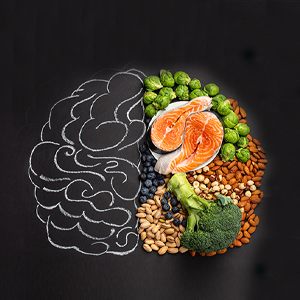 What’s good for the heart is good for the head. That includes the food we eat! Just like the rest of the body, the brain is impacted by our diet.
What’s good for the heart is good for the head. That includes the food we eat! Just like the rest of the body, the brain is impacted by our diet.
Research is looking at the complex relationship between nutrition and the brain. Studies have shown that heart-healthy eating habits may help reduce risk of dementia. As we learn more about the impact of diet on cognitive function, research points to the benefits of these three diets in particular.
The DASH eating plan requires no special foods and instead provides daily and weekly nutritional goals. This plan recommends:
- Eating vegetables, fruits, and whole grains
- Including fat-free or low-fat dairy products, fish, poultry, beans, nuts, and vegetable oils
- Limiting foods that are high in saturated fat, such as fatty meats, full-fat dairy products, and tropical oils such as coconut, palm kernel, and palm oils
- Limiting sugar-sweetened beverages and sweets
Mediterranean Diet

The Mediterranean diet incorporates different principles of healthy eating that are typically found in the areas bordering the Mediterranean Sea:
- Focus on fruit, vegetables, nuts and grains.
- Replace butter with healthy fats, like olive oil.
- Limit red meat.
- Use herbs to flavor food rather than salt.
- Eat fish and poultry at least twice a week.
The MIND Diet
The MIND (Mediterranean-DASH Intervention for Neurodegenerative Delay) combines portions of the DASH diet and the Mediterranean diet, encouraging consumption of fresh fruit, vegetables and legumes and limiting red meat, butter, cheese, and sweets. The MIND diet also emphasizes specific foods like leafy greens and berries that have been scientifically shown to slow cognitive decline.
